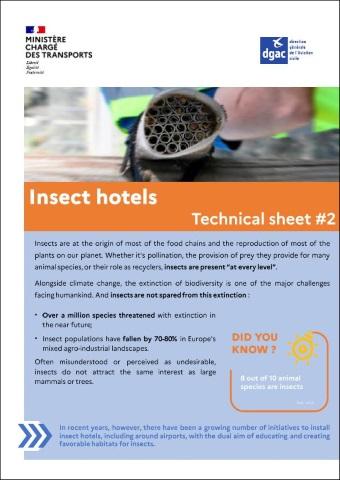Insects are at the origin of most food chains and the reproduction of the majority of plants on our planet. Whether it's pollination, prey for many animal species, or their role as recyclers, insects are present "at every level". Alongside climate change, the extinction of biodiversity is one of the major challenges facing humankind. And insects are not spared from this extinction:
- Over a million species threatened with extinction in the near future
- Insect populations have declined by 70-80% in Europe's mixed agro-industrial landscapes.
Often misunderstood or perceived as undesirable, insects do not attract the same interest as large mammals or trees.
In recent years, however, there have been a growing number of initiatives to install insect hotels, including around airports, with the dual aim of educating and creating habitats favorable to insects.
CHALLENGES FOR BIODIVERSITY
Large insect hotels bring together species that are normally solitary. The concentration of these individuals in a single location is likely to :
- provoke the emergence and spread of diseases and parasites
- attract and facilitate the work of predators.
To illustrate, these hotels have encouraged the arrival and spread of an exotic bee species in France and Europe since 2008. This species hunts down any potential nest competitors close to its territory, greatly reducing the reproductive success of wild bees. In summer, it empties the contents (larvae and resources) of other species' nests to take their place.
TO REMEMBER
- Recreate natural micro-habitats, by relaxing the management of certain areas: leave low walls, trunks standing or on the ground, large branches, piles of earth...
- If an insect hotel is retained for educational purposes, give preference to small insect hotels, with small holes (6 or 8mm diameter maximum).


| Editor | STAC |
|---|---|
| Publication year | 2025 |
| Format | A4 |
| Pages number | 2 |
